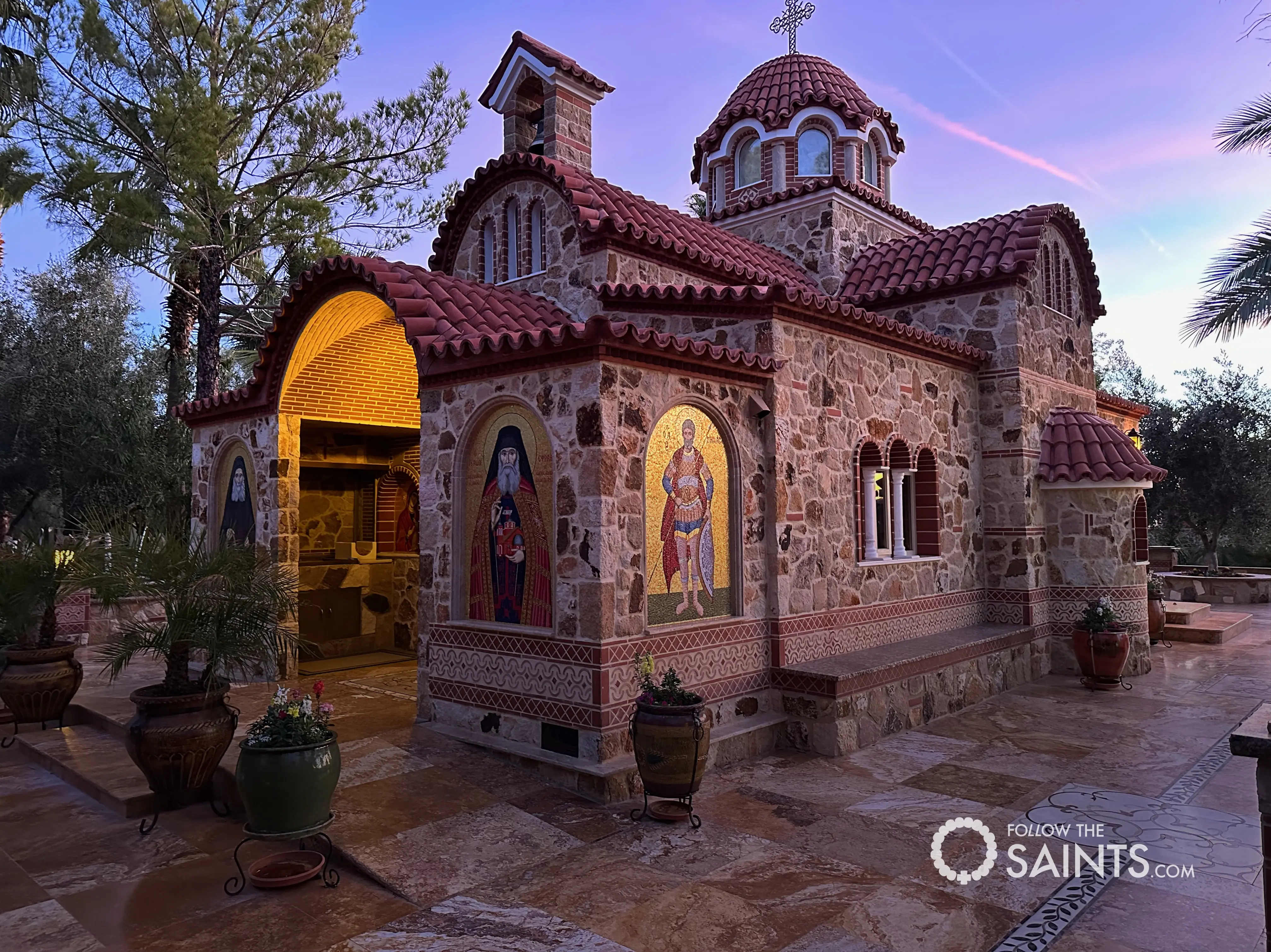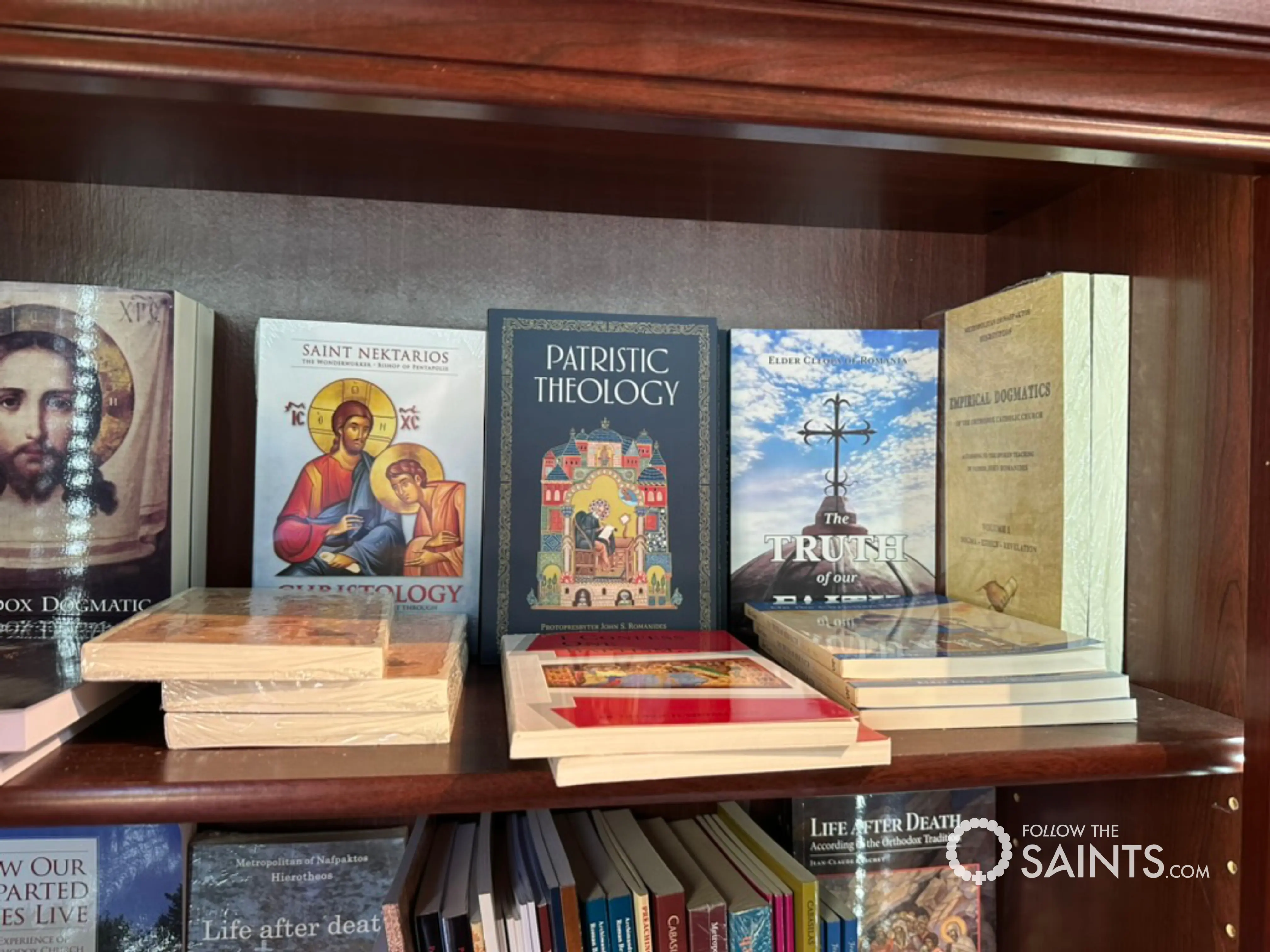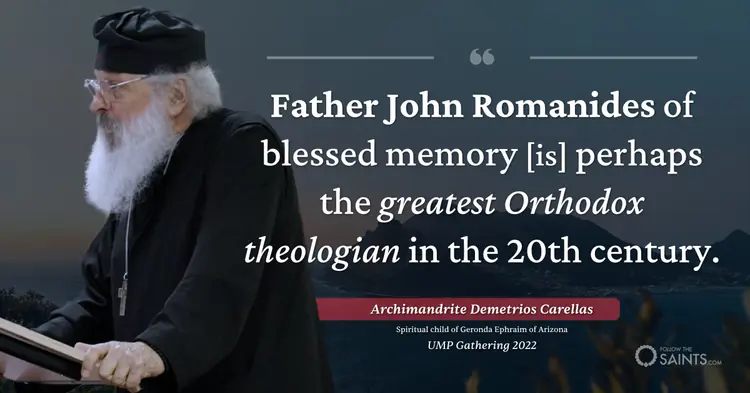On this page
Protopresbyter John Romanides stands as a towering Orthodox theologian in the 20th-century, yet his work has faced unwarranted criticism. This article aims to provide an accessible, authoritative defense of Fr. Romanides, demonstrating his profound impact on Orthodox thought and his faithful adherence to patristic tradition.
I. Fr. Romanides’ Credentials and Contributions
With this evening’s book presentation of the Holy Metropolitan of Nafpaktos, you have given me the opportunity to outline a bright and outstanding personality [Fr. John Romanides] who set a mark upon modern theological thought.
— Protopresbyter Fr. Stephanos Avramides, https://www.johnsanidopoulos.com/2017/03/my-teacher-fr-john-romanides-and-my.html
Fr. John Romanides’ credentials are impeccable:
- Protopresbyter (archpriest). This would usually be someone recognized above a normal priest.
- Professor at Holy Cross Seminary and the University of Thessaloniki
- Taught numerous seminarians who became influential in their own right
- Son of Eldress Evlampia, a nun tonsured to the Great Schema, who prophesied he would be a priest when he was a child. This Eldress was admired and respected by many, including St. Paisios the Athonite
- Spiritual child of the renowned Fr. Georges Florovsky, widely regarded as an authority even by progressive Orthodox Christians
The impact on Orthodox theology by Fr. John Romanides is profound and far-reaching:
The significance and impact of Fr. John Romanides’ writings on Orthodox theology in the twentieth century is hard to underestimate. He was a path-finder who opened the road for academic theology to return to Patristic theology and for pietism to be replaced by hesychasm.
— Archpriest Peter Heers, Patristic Theology, Preface to the English Edition
II. A Return to Patristic Dogmatics
I threw aside all the German-Catholic and Protestant manuals and systematic theological works (I have had enough of those!), and I began hungrily to study the true patristic dogmatics of the Greco-American priest and professor, whom I had not yet had the blessing to meet.
— Protopresbyter George D. Metallinos, https://www.johnsanidopoulos.com/2019/12/fr-george-metallinos-has-reposed.html
Fr. Romanides’ work represents a crucial return to the authentic sources of Orthodox theology. He tirelessly studied the Church Fathers, the Ecumenical Councils, and the living tradition of Orthodox spirituality. This return to patristic sources allowed him to present Orthodox theology free from Western influences that had crept into academic discourse.
III. The Core of Fr. Romanides’ Teachings
[…] the ‘spirit’ of the theology that he [Fr. John Romanides] taught is the theology of the Prophets, Apostles and Fathers, and accords with the teaching of the Orthodox Catholic Church. The reader should perceive this ‘spirit’ of his teaching, which is the essence of the patristic tradition.
— Metropolitan Hierotheos Vlachos, Empirical Dogmatics Vol. 1
Fr. Romanides’ work is characterized by:
- A return to authentic patristic theology
- Emphasis on the therapeutic nature of Orthodox Christianity
- Focus on the neptic tradition and hesychia
- Clarification & focus of the stages of theosis: purification, illumination, and glorification’
I am convinced that [Fr. John Romanides] is very well-read in the Neptic Fathers, especially in the writings contained in the Philokalia, and has therefore grasped the real meaning of Christianity. I believe that this is a great contribution.
— Metropolitan Hierotheos Vlachos, Orthodox Psychotherapy
Fr. John Romanides helps us understand and approach the teachings of the Church Fathers regarding the therapeutic method. He orients us towards the neptic fathers and works such as The Way of a Pilgrim and the Philokalia. His teachings emphasize the therapeutic method of the church, aligning with the deepest traditions of Orthodox spirituality.
IV. Fr. Romanides’ Historical Significance
I considered useful and beneficial to present to you… the personality of a modern Cappadocian theologian, the last great Greek Theologian of the 20th century, according to several experts, the father John Romanides, and his teaching on Orthodox Paternal Treatment.
— Metropolitan Neophytus of Morphu, https://www.youtube.com/watch?v=2V3dJqnuZ3U
Fr. Romanides’ work represents a pivotal moment in modern Orthodox theology. By reintroducing the therapeutic understanding of Christianity and emphasizing the experiential aspect of Orthodox spirituality, he provides us a much-needed corrective to overly academic or westernized approaches to theology.
V. The Reception of Fr. Romanides’ Work
The reading public can only rejoice in the publication and distribution of the university lectures of the well-known and respected pan-Orthodox Dogmatics professor, Father John Romanides.
— Protopresbyter George D. Metallinos, Dean of the Theological School of the University of Athens, Preface to Patristic Theology
Fr. John Romanides’ work has been widely recognized and celebrated within Orthodox circles, influencing a generation of theologians.
Two books heavily emphasized in Orthodox seminaries, “Orthodox Spirituality” and “Orthodox Psychotherapy,” are themselves deeply influenced by Fr. Romanides’ teachings, and he is referenced by name in both books. This explicit acknowledgment in such influential texts underscores Fr. Romanides’ significant impact on contemporary Orthodox thought.
His works have also been embraced by monastics, further attesting to their Orthodox authenticity and spiritual value.
St. Anthony’s: A Testament to Fr. Romanides’ Legacy
Fr. John Savva Romanides was a clergyman and professor of theology who taught another kind of dogmatics, beyond the scholastic rationalist models of his time, which still burden our seminaries today.
— The Fathers of St. Anthony’s monastery, https://stanthonysmonastery.org/products/patristic-theology-1

St. Anthony’s Monastery, founded by Geronda Ephraim, a disciple of St. Joseph the Hesychast, holds a revered place in contemporary Orthodoxy.
The monastery’s bookstore is renowned for its uncompromising approach: the fathers meticulously read every single book in its entirety, and only those that strictly adhere to patristic teachings earn a coveted place on their shelves. Mere presence on these shelves alone is high praise.
So what then does it mean, if one goes to their bookstore, and finds the writings of Fr. John Romanides prominently displayed?

The inclusion of Fr. Romanides’ lectures, such as “Patristic Theology” and “Empirical Dogmatics,” on these carefully curated shelves serves as a powerful endorsement of his Orthodox credibility, further validating his significant contributions to Orthodox dogmatics.
This endorsement from a highly esteemed monastic community, directly linked to Geronda Ephraim and St. Joseph the Hesychast, provides compelling evidence against any accusations of unorthodoxy in Fr. Romanides’ teachings. It underscores his standing as a trusted voice within the Orthodox tradition.
VI. Addressing Criticisms
Many criticisms of Fr. Romanides stem from misunderstanding or partial reading of his work:
[Fr. John Romanides] is being judged by people who either did not know him personally or have only partly studied his work, without examining it in its entirety. It is obvious that all those people interpret some of his theological views from their own point of view and they misapprehend them.
— Metropolitan Hierotheos Vlachos, https://www.johnsanidopoulos.com/2010/10/theological-works-of-fr-john-romanides.html
Common criticisms include:
- Strawmans & misunderstandings (e.g. his “supposed” support of Marxism, Ecumenism, Nominalism. All misinterpretations)
- Theologumena unrelated to his core teachings (e.g., comments on spinal fluid)
- Minor errors he later corrected (e.g., initial support for monophysites, which is often exaggerated)
- His stance on evolution (one of few legitimate criticisms, but not a focus of his work)
It is crucial to approach Fr. Romanides’ work holistically:
I would recommend, even beseech, the reader to look at Fr. John’s teaching in its entirety and not to pick out one phrase, take it in isolation and draw conclusions that are contrary to what he says elsewhere.
— Metropolitan Hierotheos Vlachos, Empirical Dogmatics Vol. 1
Addressing a single misinterpretation
One common misrepresentation is the claim that Fr. Romanides supported Marxism. This stems from a quote taken out of context:
Marxism and Patristic theology share the same foundation.
— Fr John Romanides, Patristic Theology, p.1 79
However, the full quote provides crucial context:
Marxism started out with principles taken from experience and ended up where it ended up. From a scholarly point of view, Marxism and Patristic theology share the same foundation, so that if Marxists and Patristic theologians would come together, they would be able to communicate with each other.
— Fr. John Romanides, Patristic Theology
Fr. Romanides is making a nuanced point about the empirical origins of both systems. He isn’t endorsing Marxism. In fact, in the very same book, he categorizes Marxism as a materialistic ideology, an atheistic theology, and a hostile force to the church.
Is it really that hard to read his entire book, before coming to conclusions?
There are many other misinterpretations, but for the purposes of brevity, we address this single one to show the ridiculousness of the majority of these claims. We invite you to seriously read the works of Fr. John Romanides for yourself, rather than busy yourself with claims from people who have only superficially read his works.
The Importance of Reading Primary Sources
One of the difficulties in modern Orthodox discourse is that people often criticize, without understanding. Many who dislike Fr. Romanides’ teachings often admit they haven’t read his works, yet rush to erroneous conclusions based on assumptions and ignorance. This approach, rooted in pride, does a disservice to both Fr. Romanides and the critics themselves.
Double Standards in Judging Theological Works
It’s crucial to approach Fr. Romanides’ work with the same charity we extend to canonized saints. Our saints made errors, yet we see the sanctity of their lives and their wholly Orthodox witness. Why do we then not extend the same consideration to Fr. Romanides, focusing on his overall contribution to Orthodox theology rather than nitpicking isolated statements or minor errors.
Now, if in their attempt to defend against this entire mountain of secularization, Westernization that they found in Greece at the time, if these blessed men [like Fr. John Romanides] made some small mistakes, we said it, they’re not [infallible] popes, they’re priests, they’re Orthodox men, they’re fighting men. In the battle, when you go out to fight, you make also some mistakes in strategy and sometimes you even get wounded.
— Metropolitan Neophytus of Morphu, https://www.youtube.com/watch?v=6mTel8pFTXI
I think of course there’s an agenda there. And there’s a kind of hypocrisy.
— Archpriest Peter Heers, Q&A Session, April 2024, https://www.youtube.com/watch?v=_cgarYCmhqA
The Danger of Knowledge Without Praxis
St. Maximus the Confessor warns that “Knowledge without praxis is the demons’ theology.” Fr. Romanides emphasizes that praxis in Orthodox tradition is related to the stage of purification. Those who criticize Fr. Romanides often focus on accumulating knowledge without attending to their own purification and illumination. This approach misses the core of Orthodox spirituality that Fr. Romanides sought to revive.
VII. The Importance of Fr. Romanides’ Work
Fr. Romanides’ teachings are particularly relevant in our times:
Since Father John speaks the truth, his words are particularly appropriate in our days, because in spite of the resurgence of Orthodox Patristic tradition in the Church in Greece after the first edition of The Ancestral Sin, Patristic teaching and theology still remain lamentably unknown to many in this country.
— Monk Damaskinos the Hagiorite of The Holy Mountain, Patristic Theology, forward to the Greek edition
His work serves as a crucial corrective to modern misconceptions about Orthodox spirituality:
For in this era, when Christianity is being presented as a philosophy or intellectual theology, or a culture and popular tradition, customs and manners, he presents this teaching about a therapeutic discipline and treatment.
— Metropolitan Hierotheos Vlachos, Orthodox Psychotherapy
Fr. Romanides’ teachings challenge contemporary Orthodox Christians to return to the therapeutic core of the faith. His work is particularly threatening to those who have departed from patristic understandings, as it exposes the inadequacies of a merely intellectual or cultural approach to Orthodoxy.
VIII. A Note on Critics and Engaging in Dialogue
Take every class you can from Fr. John Romanides. He teaches the truth.
— Elder Aimilianos of Simonopetra (advice to a theology student), https://www.johnsanidopoulos.com/2014/08/fr-john-romanides-resource-page.html
A Prominent Critic
The only well-known and outspoken critic of Fr. John Romanides is Jay Dyer.
Engaging with Critics
When encountering those who criticize Fr. Romanides, consider the following approach.
- Ask if they’ve read his works firsthand. Many critics base their opinions on secondhand information or out-of-context quotes.
- Encourage them to read Fr. Romanides’ works in their entirety before forming judgments.
- Point out the support Fr. Romanides has from respected Orthodox figures and institutions.
- Highlight the core of Fr. Romanides’ teachings on the therapeutic nature of Orthodox spirituality.
- Remind them of the importance of approaching theological works with charity, as we do with the writings of canonized saints, like Blessed Augustine
- Emphasize the danger of engaging in theology without praxis (purification), as warned by St. Maximus the Confessor.
- Direct them to authoritative sources that defend Fr. Romanides’ work, such as the writings of Metropolitan Hierotheos Vlachos.
- Ask them to directly cite their sources.
Conclusion
The theology of Fr. John Romanides is prophetic, apostolic, patristic, in other words, ecclesiastical. He was very insistent on the subject of purification, illumination and glorification, which is the method of Orthodox theology. This method was used by the Prophets, Apostles and Fathers and produces results, as the holy relics show.
— Metropolitan Hierotheos Vlachos, Empirical Dogmatics Vol. 2
Fr. John Romanides stands as a beacon of authentic Orthodox theology in an era of widespread misunderstanding. His work, deeply rooted in patristic tradition and supported by numerous respected Orthodox authorities, offers a vital return to the therapeutic core of Orthodox Christianity.
We must push back against those who, knowingly or unknowingly, seek to reject not just Fr. Romanides, but the patristic tradition he faithfully represented. His teachings on theosis, noetic prayer, and the therapeutic nature of the Church are essential for contemporary Orthodox Christians seeking to live out their faith authentically.
As we face the challenges of modern times, let us heed the wisdom of Fr. Romanides and the Fathers he so faithfully interpreted. Let us engage deeply with his works, defend his legacy, and most importantly, put into practice the timeless truths he illuminated. In doing so, we honor not just Fr. Romanides, but the entire tradition of Orthodox spirituality he so powerfully articulated.
As time passes he will take his rightful place in the spiritual firmament of our Church, because he was in accord with the spirit of the Orthodox patristic tradition and expressed its core.
— Metropolitan Hierotheos Vlachos, Empirical Dogmatics Vol. 2
Through the prayers of St. Joseph the Hesychast and Geronda Ephraim, O Lord Jesus Christ our God, have mercy on us and save us. Amen.
